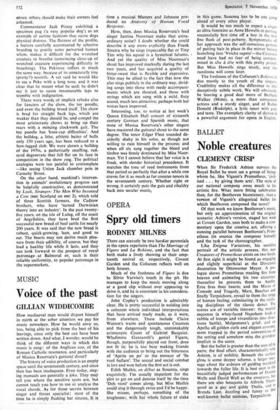MUSIC
Voice of the past
GILLIAN WIDDICOMBE
How mediaeval man would disport himself in mirth at the sober attention we pay his music nowadays. How he would envy us, too, being able to pick from the best of his leavings, since only the best can have been written down. And what, I wonder, would he think of the different ways in which this music is sung: of the Anglican coo, of the Roman Catholic resonance, and particularly of Musica Reservata's guttural shout?
The history of voice production is an empty space until the seventeenth century, and since then has been inadequate. Even today, sing- ing manuals are generally a joke. They may tell you where the sensitive spots are, but cannot teach you how to use or analyse the vocal chords. As for those secrets between singer and throat specialist: most of the time he is simply flushing her sinuses, It is
time a musical Masters and Johnson pro- duced an Anatomy of Human Vocal Response.
How, then, does Musica Reservata's lead singer Jantina Noorman make that extra- ordinary noise? I doubt whether she could describe it any more explicitly than Frank Sinatra why he sings impeccably flat or Tiny Tim why his squeal is a hysterical falsetto. And yet the quality of Miss Noorman's shout has improved markedly during the last two years, and has acquired a quality of bitter-sweet that is flexible and expressive. This may be allied to the fact that now she also sings publicly in the ordinary way, divid- ing songs into those with reedy accompani- ments which are shouted, and those with strings which are sung with a mild, fluty sound, much less attractive; perhaps both her voices have improved.
Interesting, too, to notice at last week's Queen Elizabeth Hall concert of sixteenth century German and Spanish music, that none of Musica Reservata's other singers have mastered the guttural shout to the same degree. The tenor Edgar Fleet sounded de- cidedly shaky in his solos, as though not willing to ruin himself in the process; and when all six sang together the blend and timbre was firmly dominated by Miss Noor- man. Yet I cannot believe that her voice is a freak, with slender historical precedence. It matches the tone of reed instruments from that period so perfectly that after a while one craves for it as much as for counter-tenors in the seventeenth century. Whether right or wrong, it certainly puts the guts and ribaldry back into secular music,






















































 Previous page
Previous page